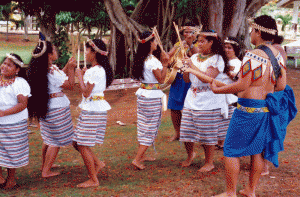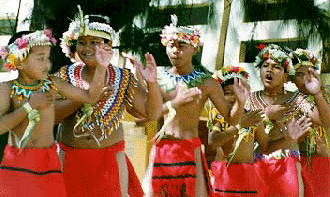More about “Lieweila”
In ancient times, this small group of indigenous islanders navigated across the Pacific Ocean in outrigger canoes. In the 1800s, guided by their knowledge of the stars and the ocean swells, they left their typhoon- and earthquake-devastated atolls in the Caroline Islands. When they arrived in the Mariana Isla nds to the north, they found themselves at the mercy of Spanish colonialists. Later, they lived under German and Japanese rule. In 1986, along with the Chamorro people, the Refalawasch became naturalized U.S. citizens. Today the Refalawasch are struggling with rapid development, an influx of foreign workers, and the erosion of their language and culture.
nds to the north, they found themselves at the mercy of Spanish colonialists. Later, they lived under German and Japanese rule. In 1986, along with the Chamorro people, the Refalawasch became naturalized U.S. citizens. Today the Refalawasch are struggling with rapid development, an influx of foreign workers, and the erosion of their language and culture.
In LIEWEILA, the Refalawasch come together to tell their story for the first time. Narrator Cinta Matagolai Kaipat recounts her early childhood on the remote island of Pagan, where radio contact was the only means of communication, and her family’s move to the capital island of Saipan. Through wonderful old photographs, lithographs, and lush contemporary images, accompany these Pacific Islanders as they explore the past and imagine the future. Learn about their traditional navigation, dance, singing, weaving, storytelling, and many other practices dating long before outsiders arrived from beyond the horizon.
LIEWEILA is perfect for classroom use: history, anthropology, hum an rights, ethnographic studies, native religion and spiritism, international development, women of the world, colonialism studies, and Pacific Island studies.
an rights, ethnographic studies, native religion and spiritism, international development, women of the world, colonialism studies, and Pacific Island studies.
“Fantastic photography and wonderful archival footage.” – Jeff Marck, Research School of Pacific and Asian Studies, Australian National University